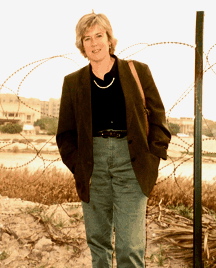Elspeth Ritchie was on the front lines dealing with the military’s mental-health issues as an Army psychiatrist, including several senior positions following 9/11, for nearly a quarter century. She has studied and tended to troops’ minds on assignments around the world, including in Cuba, Iraq, Somalia, South Korea and Vietnam. She retired as a colonel last year.
By Elspeth C. Ritchie, MD (USA, MC ret.)

Ritchie in Baghdad, 2004
As usual there has been a bumper crop of stories about Soldiers over the recent Memorial Day holiday. The stories — in print and on TV — praised the wounded, family members, the dead. They rang true to me.
I recently retired from the Army, after 24 years of active-duty service. So why did the praise leave me uneasy, and feeling cynical? I love the Army and certainly appreciate the American public’s support for the American Soldier. So what’s wrong with the hooahs? I think it is because it tends to portray the Soldier as hero, or victim — or both.
The hero version has the Soldier larger than life, and therefore unreal…not quite human. My discomfort here is over this version of the Soldier: selfless, polite, intelligent — and lethal. Who can live up to such an image? It implies that the sacrifices the Soldiers make are extraordinary. In reality there are scores of professions that make sacrifices and take risks. (I’m referring here to Soldiers in the most generic way, incorporating comrades in the Marines, Navy, Air Force and Coast Guard as well, and their reserve and Guard counterparts).
The victim variant has the Soldier as misguided, misled, and helpless — “a sad sack.” Yet the US has had an all-volunteer Army for decades, and our Soldiers have enlisted with a near-certainty that they will be going to war. Indeed, in my experience most want to go to war.
And, yet, though they know the risks involved, there is some unvoiced sentiment that we troops have somehow been duped into making a bad decision. I don’t buy that one bit. I have seen many Soldiers thrive in the military, getting an education and opportunities that are available nowhere else. For many, the Army acts as a lifesaver to a drowning kid.
Soldiers and other service members are drawn from all walks of life. They are ordinary people. Who, yes, indeed, do extraordinary things.
I am not alone in my cynicism. A colleague writes:
It is the Hollywood-ism of the profession that drives me nuts. The seating of the Soldier in his dress uniform so the cameras can capture him/her in their splendor, the casting of actors deliver speeches as the actual soldier/mother stand to observe. The overweening sense of pity and sorrow for these brave folks that entered their job with no illusions and certainly no wish for charity or debt.
Indeed, there is a conflicting message here. The army teaches us to move on, despite discomfort or adversity. But the civilian world speaks of entitlements. They talk of the veteran in terms of debt, as people that are owed something. Perhaps Veterans are but the message is off key and probably unhelpful.
For all the pomp and ceremony, it might be more meaningful to implement policies giving veterans guaranteed jobs when they come home. Healthy or injured, we will find you work. That simple promise would make all the political grandstanding and media-fest at least tolerable.
Why do these myths persist? Some think it is because the American public — only 1% of which now wears the nation’s uniform — feels guilty that it is not playing a bigger part in the war effort. So making Soldiers different from the rest of society reduces that guilt.
Or maybe we need heroes to admire, as well as victims to save? Both are admirable. But let us remember that our Soldiers are ordinary citizens, who do extraordinary acts.
Now that I no longer wear Army green, I can speak freely. And so I say to all Americans – especially those who have lost a loved one, friend or neighbor in the nation’s post-9/11 wars, or seen one come home wounded, mentally or physically – that my comrades and I did our best. Just like our Soldiers are doing today, and will do tomorrow.


